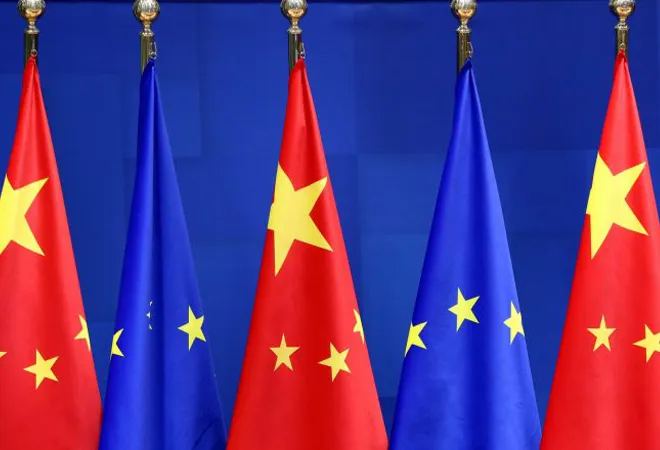
If the political leadership of the European Union (EU) have any political sense left, it will ignore the strategic self-goal scored by its bureaucrats. The in-principle agreement on investment — the Comprehensive Agreement on Investment (CAI) — signed by the European Commission (EC) and China is a sell-out of Europe’s core values. It has played into the hands of China without seeking anything in return but assurances; these have meant nothing in the past and will come to naught in the future. It displays a naivete by the EC, a body tasked with proposing new laws and implementing the decisions of the European Parliament and the Council of the EU, in international relations by those whose only skins in the game are the unelected positions they have managed to wangle. The “win-win” chorus is really, China winning twice over — like its track record during the WTO negotiations, China will not change; instead, it will use the rules of law around which the rest of the democratic world functions to supress and smother its European partners.
The EU bureaucracy is playing by China’s rules, dancing to China’s tune. The use of the word ‘values’ in the announcement devalues the term. It glides over Chinese Communist Party’s (CCP) human rights abuses in China, consistent breach of rule of law in international dealings, bullying allies such as Australia and Norway, and territorial aggression on democracies such as India and around the South China Sea. It ignores the fact that while the deal will help drive China’s President Xi Jinping’s Belt and Road Initiative into the EU on the physical side, it will equally enable Huawei to drive 5G telecommunications there and hand over the most precious commodity of the 21st century, citizen data, to the CCP. Worse, this deal has not even mentioned, leave alone questioned, China’s National Intelligence Law that effectively turns every Chinese entity into an intelligence gatherer.
"< lang="en-GB">The EU bureaucracy is playing by China’s rules, dancing to China’s tune. The use of the word ‘values’ in the announcement devalues the term. It glides over Chinese Communist Party’s (CCP) human rights abuses in China, consistent breach of rule of law in international dealings"
All this, including the fact that Xi has taken his country into a no-trust zone globally, is known to all. The only way the EC would have negotiated this deal is with its eyes wide shut. As argued earlier by Amrita Narlikar and Samir Saran, China has gamed a round of Realpolitik, while the EU has weakened its own hand, given short shrift to its own values, and undermined the position of its friends and allies.
What makes it worse for the EU — and through the supply chain tributaries that flow through it for the rest of the world — is that in the 21st century there are no ‘investment’ deals anymore. A China is not a US or an India. Every deal with this nation has to be seen through the prism of national security. Corporate interests, from Germany and France that seem to have pushed the deal, have to follow, not lead national interests. As the deal was being signed, reports about the Swedish telecommunications equipment firm Ericsson pushing the country to accept Huawei into its borders or else it would shift base elsewhere streamed in; this is one more corporate tail trying to wag the national dog — in this case, against the advice of Swedish Armed Forces and the Swedish Security Service.
"A China is not a US or an India. Every deal with this nation has to be seen through the prism of national security"
The CAI deal stands on an imaginary assumption that China will honour the deal because it has signed it, or the EU wants it to, or even because it is facing pressure from the US. What the EC is touting as a deal is a bunch of hygiene factors that are taken for granted. It is like saying contracts must be honoured, technology must not be snatched, intellectual property must be respected. These include:
- Level playing field for EU investors
- Clear rules on Chinese state-owned enterprises
- Transparency of subsidies
- Prohibiting forced technology transfers
- Easier authorisations and procedures for European companies
- Access to China's standard setting bodies for European companies
As an example, let’s examine the part on China’s state owned enterprises (SOEs). The CAI “seeks to discipline the behaviour of SOEs” by getting them to act commercially and without discrimination. But the fine print within the press release is clear: it is up to China to “allow” for any assessment on whether “the behaviour of a specific enterprise complies with the agreed the CAI obligations”. If the problem goes unresolved, it will go to a dispute resolution mechanism, under the CAI. If the EU believes China will allow itself to be governed by any law, even its own, it’s in for a shock. After all, SOEs contribute 30% to China’s GDP — putting that GDP at risk on something as absurd as a ‘dispute resolution mechanism’ that functions well among countries that follow the rule of law is expecting too much out of CCP.
To believe that a nation that doesn’t believe in the rule of law, doesn’t function within the confines of a rules-based order, and whose track record of intellectual property and business disgorgement has been an economic constant will change overnight because of a deal signed with self-serving bureaucrats is not going to be easy to digest by political interests beyond large corporations. As European small and medium enterprises that do not have the access to power and rely only on rules to protect contracts will find, justice may not come easy — the judiciary in China is not independent.
"< lang="en-GB">To believe that a nation that doesn’t believe in the rule of law, doesn’t function within the confines of a rules-based order, and whose track record of intellectual property and business disgorgement has been an economic constant will change overnight because of a deal signed with self-serving bureaucrats is not going to be easy to digest by political interests beyond large corporations"
Thankfully, there are two checks that this deal will need to clear, and two actors that can bring the required balance — the Council of the EU and the European Parliament — before it translates into law. Both of these have a greater accountability to their voters and perhaps understand the politics of the deal better than bureaucrats. If any sense prevails, they will spike this deal. The fact that the US Presidency by then will be functional would mean that the hurried manner in which this deal has been signed will be scrutinised in a wider contexts of geopolitics and geoeconomics around the EU’s strongest strategic partner. Unless, the Biden administration too bends to the will of the CCP, this is a no-deal.
What’s more surprising is the fact that both France and Germany have made their strategic and security intentions clear. In September 2020, Germany unveiled its policy guidelines for the Indo-Pacific region that saw the region as an important trade route that needed to be protected through a legally binding ‘code of conduct’ between China and ASEAN nations in the South China Sea; this, it said, could be used as the basis of “a future EU strategy”. The legal binding aside, this was the right signal and a move in the right direction. France sees the Indo-Pacific as part of its foreign policy, as does the Netherlands. Entering the strategically crucial Indo-Pacific and the troubled waters of the South China Sea are serious matters that run contrary to China’s strategic ambitions in the area. The mismatch between these countries’ strategic intent and their economic handshake is unclear.
Further, within the EU, it’s not that just a handful of countries can push the rest of the member states into submission before China. According to reports, from Italy and Poland to Belgium and Spain, diplomats have raised concerns about the way Germany and France have pushed through the investment agreement; they raised concerns that the deal risked alienating the Biden administration. To forge a corporate-driven deal in such waters without considering the strategic direction shows a dissonance that only a more accountable EU politics — through the EU Council and the European Parliament — can fix.
How the EC managed to get this deal through hardly months after the uncontrolled and unrelenting roguish behaviour of China on EU member states is another point that confounds the mind. Chinese Foreign Minister Wang Yi had said that the Czech Senate President Milos Vystrcil’s trip to Taiwan made him “an enemy of 1.4 billion Chinese people.” Both Germany and France had then stood up for EU values. The EU signing a deal barely four months after such brazen misbehaviour incentivises CCP leadership to do worse, and the EU should be ready for more such humiliations. It tells China that the EU will speak in one way and act in another. It will speak hard words but with a bent stance. As a result, Xi’s foreign policy playbook in general and EU-China relationship in particular will not change — threats will continue to dominate, perhaps even accentuate, while the economic discourse powers its supply chains.
Those thinking that the world must engage in order to influence are living in the past. China did not change as expected following its entry into the WTO. The world fed China despite being spat on by it (forced technology transfers, institutionalised intellectual property thefts, hurdles to markets). China became larger and stronger to a point that it’s too big to ignore and is now pushing its weight around the world, from its neighbourhood to Africa, exporting its debt-trap diplomacy on the one hand and aggressive military misadventures on the other. China didn’t change as a $1.5 trillion economy when it got a passport to trade with the world (it joined the WTO in December 2001). To expect it to change after its spectacular success as a $14.3 trillion economy with far greater power and influence is being intellectually dishonest.
The ball now lies in three courts — the European Parliament, the Council of the EU Council, and the Biden administration. How these three poles uphold the liberal values they had authored in the middle of the 20th century will determine the economic fate of the EU in the 21st century.
The views expressed above belong to the author(s). ORF research and analyses now available on Telegram! Click here to access our curated content — blogs, longforms and interviews.




 PREV
PREV


